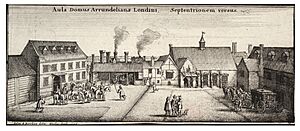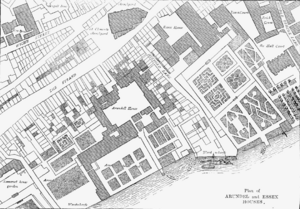Arundel House facts for kids
Arundel House was a large, important house in London, almost like a palace. It was located between a famous street called the Strand and the River Thames. It was also close to the Church of St Clement Danes.
Contents
History of Arundel House
From Bishops to Earls
Long ago, in the Middle Ages, Arundel House was owned by the Bishops of Bath and Wells. Back then, it was known as "Bath Inn." This was similar to other big London houses owned by important people.
In 1539, during a time called the Dissolution of the Monasteries, King Henry VIII took control of many church properties. He then gave Arundel House to William Fitzwilliam, Earl of Southampton.
After Fitzwilliam passed away, the house went back to the King. In 1545, King Henry VIII gave it to Thomas Seymour, 1st Baron Seymour of Sudeley. Thomas Seymour was the younger brother of Queen Jane Seymour, who was King Henry's third wife. He was also the uncle of the young King Edward VI.
In 1549, Thomas Seymour faced serious charges and lost his life. The house was then sold to Henry Fitz Alan, 12th Earl of Arundel, for about £40. This was a lot of money back then!
The Howard Family and Famous Collections
Later, the house was passed down to the Howard family through marriage. It became home to the "Arundel Marbles." This was a very famous collection of ancient sculptures. These sculptures belonged to Thomas Howard, 2nd Earl of Arundel (1585–1646).
Most of these amazing sculptures are now kept at the Ashmolean Museum in Oxford. However, one special carving from the 2nd century AD, which was once at Arundel House, can be seen at the Museum of London.
Arundel House also hosted Wenceslaus Hollar, a talented artist and mapmaker. He was supported by Thomas Howard. The Royal Society, a famous group of scientists, even held their meetings here for a few years in the late 1660s.
Around 1618, a well-known architect named Inigo Jones designed a beautiful Italian-style gateway for Arundel House. He likely also designed other parts of the building.
Later Years and Legacy
After being released from the Tower of London in 1621, Henry Percy, 9th Earl of Northumberland lived in Arundel House. It was still known by its old name, "Bath Inn," at that time.
The original Arundel House from the 17th century was eventually taken down. Today, its memory lives on through Arundel Street and Surrey Street in London. The current Arundel House, built in the late 1800s in a Tudor Revival style, is now a conference center. It serves as the main office for the International Institute for Strategic Studies.
The Roman Baths, Strand Lane, which are very old, were located within the grounds of Arundel House. They are now owned by the National Trust.
It is believed that a famous piece of music, Spem in alium by Thomas Tallis, was first performed in the Long Gallery of Arundel House. This likely happened in 1568 or 1569.
See also
 In Spanish: Edificio Arundel para niños
In Spanish: Edificio Arundel para niños
 | Emma Amos |
 | Edward Mitchell Bannister |
 | Larry D. Alexander |
 | Ernie Barnes |



